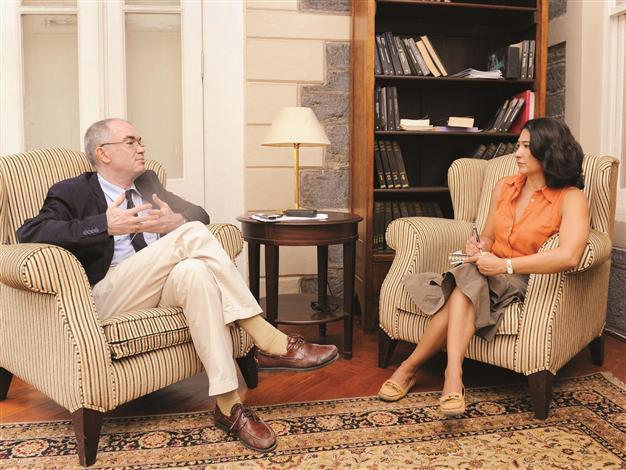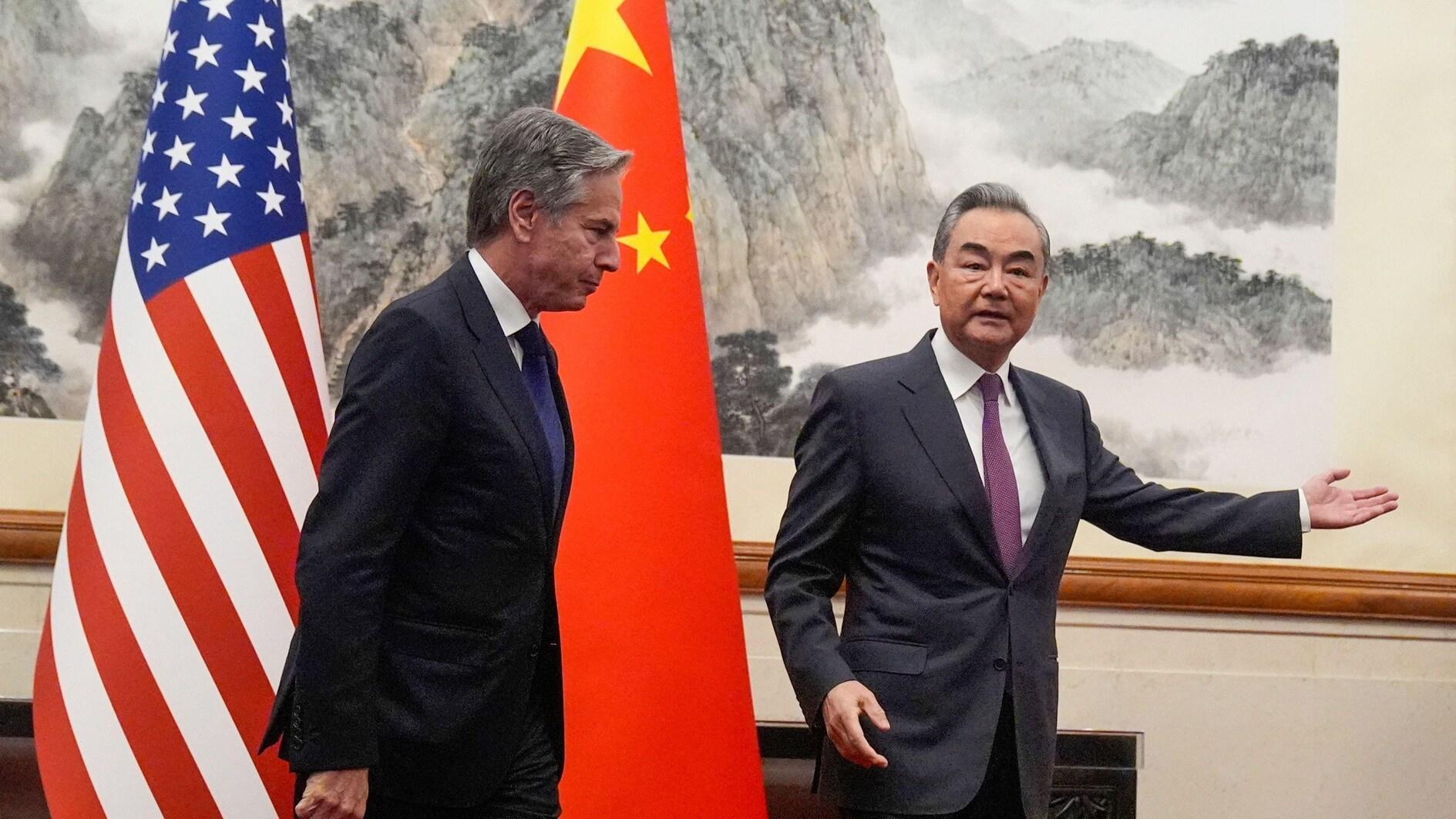‘Turkey needs to grab bull by the horns on foreign policy’
ISTANBUL - Hürriyet Daily News

The stakes in Syria are extremely high, and the ability of Turkey to shape the flow of events is extremely limited, says Kemal Kirişçi adding, ‘You realize how unrealistic it is to think of Turkey as a game setter.” DAILY NEWS photo,S Emrah GÜREL
Ankara succeeded in becoming a regional player that was a force for dialogue over the past 10 years, but its foreign policy has lost its luster as Turkey has come to be seen as a divisive actor, according to a Turkish professor.“There is a feeling that Turkey is encouraging a polarization along Shiite-Sunni lines in the Middle East. We may cry at the top of our lungs that this is not what we are doing, but this is what the world thinks, and we cannot keep blaming the world,” said Kemal Kirişçi, an international relations professor.
“We need to take a look in the mirror,” he told the Hürriyet Daily News this week.
You argue that Turkey’s integration with its neighborhood began prior to the rule of the Justice and Development Party (AKP). How, then, does the AKP differ from others in its foreign policy?
The geography of the integration has widened and deepened. The AKP introduced a policy with a capital “P.” For instance, agreements to lift visas were realized in a more systematic way. But a lot of the motivation for that policy came primarily from the “Anatolian tigers,” who were seeking new markets. The integration policy prior to the AKP was a top-down process, whereas it has become a bottom-up process in the last decade. Right now, however, we are facing the challenge of the Arab Spring, and these policies may be, to some extent, undermining Turkish security for the first time.
In what sense is the Arab Spring posing a challenge?
The Syrian crisis and the way in which Turkish foreign policy overturned its image of the 2000s in the course of the last two years [are the challenges].
Whether we accept it or not, Turkey is fanning the fires of polarization and conflict in the eyes of the Middle East. I think it will benefit Turkey enormously to take the bull by its horns. I am afraid the old habits of the 1980s or the 1990s are coming back. [The old habit of saying] “We are always in the right, we always mean well; the problem is the others” [is returning]. Turkey needs to accept that it has started to be seen as creating anxiety in the Middle East.
Only two years ago, everyone was applauding Turkey. The prime minister was appreciated for visiting Shiite regions [in Iraq] as a Sunni, and it was on the verge of bringing Syria and Israel to the table. These things are very important. Yet Turkey has wasted its capital in the course of the last two years, and it will be very difficult to build it up again.
Turkey has achieved a miracle in the last decade. It signed [reconciliation] protocols with Armenia. The whole world was looking with their mouths agape at Turkey, thinking it was possible to solve problems that were thought of as frozen. You had the foreign minister inventing a term called the “zero-problems” policy which was adopted by the international community. Turkey experienced a decade in which it showed the world that it was becoming a player, encouraging reconciliation, dialogue and even integration. This, I think, is changing fast.
There is a feeling that Turkey is encouraging a polarization along Shiite-Sunni lines in the Middle East. We may cry at the top of our lungs that this is not what we are doing, but this is what the world thinks, and we cannot keep blaming the world. We need to take a look in the mirror. This is also spilling into Turkey somewhat. We have a prime minister who only two years ago was expressing empathy with the Kurds. Today he is talking about ensuring the lifting of [Kurdish deputies’ parliamentary] immunity. I remain baffled as to how this could have taken place so fast.
If we have to stop pinning the blame on others, what went wrong as far as Turkey is concerned?
Maybe Turkey was not prepared to play the regional and global role it aspired to play.
First, maybe we should be modest and recognize the complexities of the world and of our own country, too.
I think the ambitions were set too high. There had to be a recognition that many of the problems Turkey so courageously set out to address have been around for a long time, and many actors have tried to address these problems but have been unsuccessful. We should have been a bit more realistic as too how far we could go in resolving these problems: Be a little bit more humble and scale down your ambitions; [in doing so, you won’t] experience so much disillusionment, but will reduce the awkwardness that comes with a world that includes critics that say, “Oh, you messed it up.” Do a little bit more thinking.
We were involved with Syria very closely. I happen to believe in the logic behind this. By engaging Syria, by opening up the borders and by encouraging interaction, we believed that in the long run Syria would reform itself. But I suspect a lot more thinking should have gone into it. A lot more scenario-building should have gone into it.

"We should be modest and recognize the complexities of the
world and of our own country, too. I think the ambitions were
set too high," says Kirişçi. DAILY NEWS photo, S Emrah GÜREL
I think part of the bafflement is a result of what has happened in Syria. Syria is a real challenge. The stakes are extremely high, and the ability of Turkey to shape the flow of events is extremely limited. You realize how unrealistic it is to think of Turkey as a game setter.
Second, it has to do with Turkey domestically. I believe that in 2005-2006, we were becoming a real pluralist democracy in Turkey, where diversity was understood and respected, in the sense of ideas, thoughts, ethnicity and religion. I am coming to recognize that this is not the case.
There is a Lebanese political scientist called George Salama with a book called “Democracy without Democrats.” I think this is our dilemma. I think we have a democracy of some sort, but we still do not have our democrats and this is reverberating throughout our domestic politics, as well as in our foreign policy.
[CNN’s Christiane] Amanpour interviewed our prime minister. She said that right now, there were more journalists behind bars in Turkey than in Iran and China, but our prime minister managed to come up with some explanation. That may seem OK to many people, but the idea that there are more journalists in prison in Turkey than in Iran and China means there is a problem for me. We cannot keep sweeping these things under the rug and find an explanation to minimize its significance. There are many students behind bars because they have protested in one way or another. There is something that is not right that needs to be addressed. We have a prime minister saying that he is going to do everything to get the immunities lifted for politicians that don’t deserve them.
I thought we had become a pluralist democracy. [You have to accept] there are different opinions [and accept] even the most uncomfortable reality; and there is one – a picture showing members of the Turkish Parliament hugging people a good proportion of public opinion consider terrorists. I know it’s extremely provocative, but this is not the way a pluralist democracy handles it. I am not naïve; these are very difficult problems. But a pluralist democracy manages to solve it in a more peaceful way than others do.
WHO IS KEMAL KİRİŞÇİ ?
Kemal Kirişci is a professor in the Department of Political Science and International Relations at Boğaziçi University. He holds a Jean Monnet Chair in European Integration and was also the director of the Center for European Studies at the university between 2002 and 2008. He received his Ph. D. from City University in London in 1986. His areas of research interest include European integration, asylum and immigration issues in the European Union, EU-Turkish relations, Turkish foreign policy, ethnic conflicts, and refugee movements. He has previously taught at universities in Britain, Canada, and the United States.
Kemal Kirisci will be taking up the TÜSİAD Senior Fellow position at the Brookings Institute in Washington, D.C. from January 2013.
















